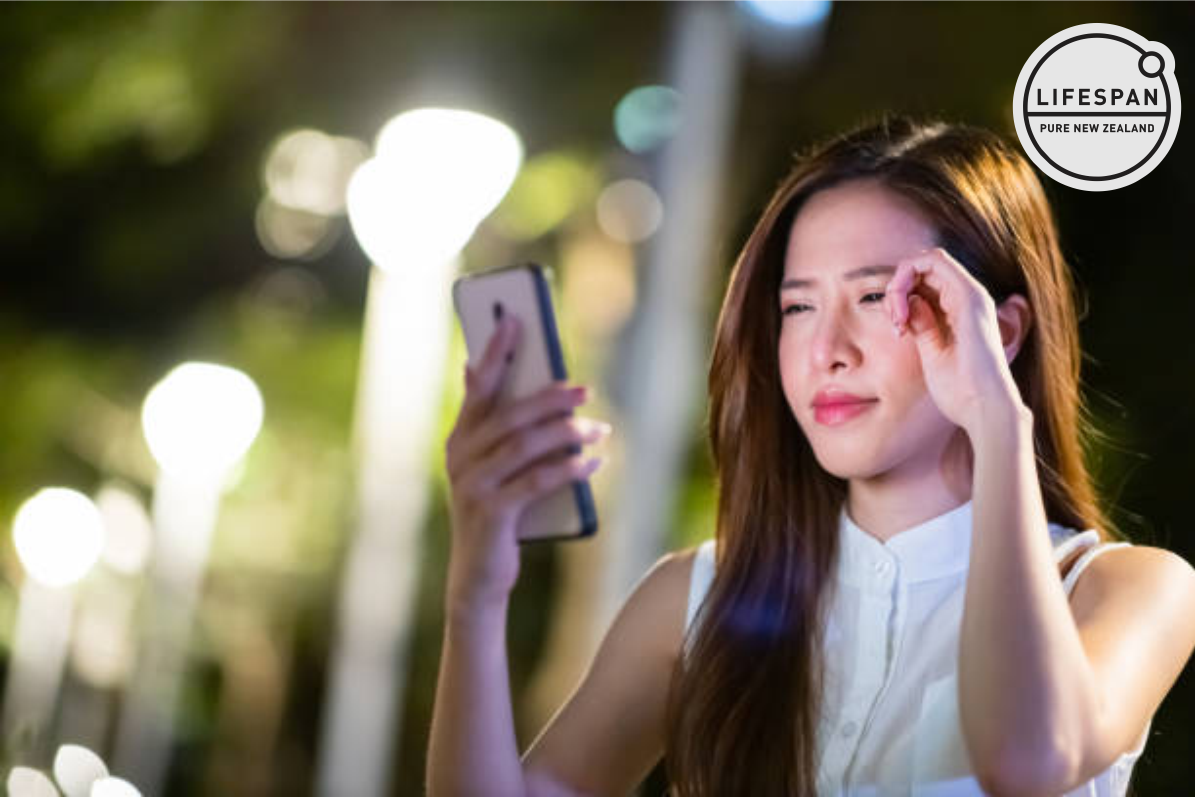
Natural eye health supplement
Premium Bilberry + Lutein capsules are an optimal choice if you looking to enhance your eye health and vision.
Tailor-made for the modern age, where digital screens are a constant presence, this supplement is a natural ally in eye care.
Recent posts
-

-
 Tired Eyes: Recognising the Signs of Eye StrainBy Ben Winters
Tired Eyes: Recognising the Signs of Eye StrainBy Ben Winters

About the Author
Ben Winters is a passionate advocate for natural health and wellness. With years of experience in the field of nutritional supplements, Ben has dedicated his career to developing products that not only address specific health concerns but also promote overall well-being. His expertise in utilising of natural ingredients, like the European bilberry, has led to the development of this exceptional eye health supplement.

Eye Health and the Impact of Screen Time
By Ben Winters
Screen time can cause eye strain, having a negative impact on eyesight and eye health.
Eye health, and mitigating the risk of eye strain is of growing importance in modern society, where digital devices dominate our work and leisure activities. As we spend increasing hours in front of screens, understanding the impact on eye health becomes more important, and taking steps to protect our eyes becomes an essential part of our daily routine.
This proactive approach includes regular eye exams, using protective eyewear, integrating eye-friendly habits into our screen time, and considering supplements like bilberry extract, lutein, zeaxanthin, and zinc, which are known for their benefits in maintaining eye health. These steps will help to keep our vision sharp and healthy in a digitally dominated world.
Digital eye strain is also known as computer vision syndrome, and is characterised by a range of eye-related and visual symptoms resulting from prolonged use of digital screens such as computers, tablets, and smartphones.
This condition typically includes discomforts like eye fatigue, blurred vision, dry eyes, and sometimes headaches, reflecting the strain our visual system undergoes in the digital environment. This condition is directly linked to our increased screen time, whether for work, education, or entertainment.
Factors such as prolonged exposure to screens, inadequate lighting, and improper screen distances contribute significantly to digital eye strain. Symptoms range from headaches and blurred vision to dry eyes and neck pain.
Blue light, the high-energy visible light emitted by digital screens, has been found to contribute to eye fatigue and can disrupt sleep patterns.
Prolonged exposure to blue light, especially during evening hours, can interfere with the body's natural sleep-wake cycle, leading to difficulties in falling asleep and reduced sleep quality. This effect on sleep is attributed to blue light's ability to suppress the production of melatonin, the hormone responsible for regulating sleep.
In terms of eye health, the intensity of blue light can strain the eyes, resulting in symptoms such as soreness, dryness, and a feeling of tiredness in the eyes after long periods of screen use.
Protecting our eyes and preventing eye strain from prolonged screen time is something we all need to consider to ensure long-term visual well-being.
One of the simplest yet most effective preventative measures against digital eye strain is taking regular breaks. The 20-20-20 rule is a popular method: every 20 minutes, take a 20-second break to look at something 20 feet away.
This practice helps reduce eye fatigue by relaxing the eye muscles, which are often strained from continuous close-up screen viewing. Integrating these short breaks into your screen time routine can significantly mitigate the effects of prolonged digital exposure on your eyes.
The setup of your digital workspace also plays a role in preventing eye strain. Ensure your screen is at an eye level and about an arm's distance away, reducing the need for your eyes to strain to focus. Adjusting the screen brightness to match the lighting in your room also helps, as does using an anti-glare screen if possible.
Additionally, consider the ergonomics of your chair and desk to maintain a comfortable posture, which indirectly affects your eye health by reducing the strain on your neck and shoulders.
Beyond screen-related adjustments, overall lifestyle changes can significantly contribute to eye health.
Regular eye exams to detect any underlying vision problems that might exacerbate eye strain are recommended. Wearing glasses with blue light filters can help minimise blue light exposure, especially during prolonged computer work.
Staying hydrated and ensuring your eyes are sufficiently lubricated, either naturally or with the help of eye drops, can also prevent dryness and irritation from screen use.
Balancing screen time with outdoor activities is another useful strategy for maintaining eye health. Engaging in outdoor activities provides a necessary break from screens and exposes our eyes to natural light, which is beneficial for vision. Natural light helps regulate our circadian rhythms, improving sleep quality, and has been shown to reduce the risk of myopia (nearsightedness) in children and young adults.
Another bonus is that outdoor activities encourage a change in focus and distance, allowing eye muscles to relax and reducing the risk of eye strain. By incorporating regular outdoor breaks into our daily routine, we can offset the visual stress caused by extended screen use, contributing to overall eye health and well-being.
Eye health can be improved through maintaining a balanced diet rich in vitamins and minerals, which support visual function and protects against eye diseases.
A balanced diet is important in maintaining overall health, including that of our eyes. Nutrients such as vitamins, minerals, and antioxidants support the proper functioning of the eyes and can protect against damage caused by prolonged screen exposure.
Certain nutrients are particularly beneficial for the eyes. Vitamins A, C, and E are known for their antioxidant properties, helping to combat oxidative stress that can damage eye cells. Omega-3 fatty acids, found in fish, green lipped mussels, and flaxseeds, are important for maintaining the health of the retina and may help prevent dry eyes.
Zinc, present in nuts and whole grains, plays a role in transporting vitamin A from the liver to the retina, aiding in melanin production, a protective pigment in the eyes.
Consuming foods rich in these nutrients can help reduce the risk of eye strain. For instance, leafy green vegetables like spinach and kale are high in lutein and zeaxanthin, which have been found to improve contrast sensitivity, a factor important in screen use.
Carrots, known for their high vitamin A content, support good vision, especially in low light. Berries and citrus fruits, high in vitamin C, contribute to the health of blood vessels in the eyes, essential in preventing fatigue.
Making small changes to include these eye-healthy foods can be easy and delicious. Incorporating a salad with leafy greens, nuts, and seeds into your daily meals can boost your intake of essential vitamins and minerals. Opting for fish a few times a week provides Omega-3 fatty acids, and snacking on fruits like oranges and berries offers a tasty way to consume more vitamin C.
These dietary adjustments not only contribute to eye health but also offer overall health benefits.
While a balanced diet is the best way to obtain these nutrients, supplements can also play a role in maintaining eye health, especially when dietary intake is insufficient.
Supplements containing bilberry extract, lutein, zeaxanthin, and zinc are noted for their support of eye health. Bilberry extract supports overall eye health through its high levels of antioxidants. Lutein and zeaxanthin, act as natural sunblock for the eyes and help protect them from harmful blue light. Zinc helps to transport vitamin A from the liver to the retina, aiding in the production of melanin, which protects eye health.
Incorporating these supplements into your eye care routine can be a useful complement to a balanced diet, especially for individuals who spend extended periods in front of screens, offering additional protection against the strain and fatigue caused by blue light exposure.
Effectively managing screen time and taking proactive measures is essential for preserving eye health and preventing eye strain, especially for people who spend hours each day in front of a screen.
Taking a holistic approach is beneficial. This includes ensuring a well-balanced diet, rich in eye-friendly nutrients, integrating supplements like bilberry extract, lutein, zeaxanthin, and zinc, and making lifestyle adjustments that reduce digital eye strain.
By embracing these practices, we can protect our eyes from the potential harms of prolonged screen exposure.


